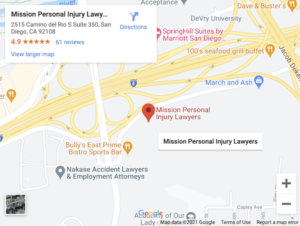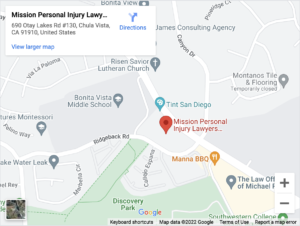
Your brain is a complex organ susceptible to damage in high-impact situations like car crashes or falls. Concussions are one type of injury that your brain can sustain, leading to issues like memory loss and long-term damage.
In the United States, three million people get concussions every year and end up having to pay significant medical costs for imaging and treatment in order to recover successfully.
It is essential to understand how a concussion can occur and what you can expect if you’ve suffered one as a result of an accident.
Table of Contents
How Concussions Happen and How To Understand Their Severity

Your brain is a soft organ surrounded by fluid, which functions like a cushion that protects it from your skull. A concussion happens when your brain twists or bounces inside the skull or experiences whiplash-like movements that cause it to collide with the skull. This is often due to sudden force or impacts.
For this reason, incidents like car accidents are a leading cause of concussions, as are falls and sports injuries.
These injuries bruise and stretch nerves and blood vessels, causing changes to brain chemicals that result in temporary loss of normal functions. Although concussions are often called mild injuries, they can still cause severe issues that last for days, weeks, or even months.
Some of the most common symptoms and signs of a concussion are:
- Pressure in the head
- Headaches
- Sensitivity to noise and light
- Nausea
- Vomiting
- Confusion
- Balance issues
- Feeling sluggish
- Mood or personality changes
- Being dazed
- Moving clumsily
- Losing consciousness
- Memory loss
Concussions are ranked by how severe they are. Grade I concussions are the most mild type that don’t cause loss of consciousness. If they cause any memory loss, it generally lasts for 30 minutes or less.
Grade II concussions may result in a loss of consciousness for less than five minutes or memory loss for anywhere from 30 minutes to 24 hours.
A Grade III concussion is the most severe type. It causes loss of consciousness that lasts more than five minutes or memory loss that lasts more than 24 hours.
What Type of Memory Loss Do Concussions Cause?
Most people who have a concussion experience some memory loss. How significant the memory loss is and how long it lasts depends on the severity of the concussion.
This means you may struggle with recalling what happened before and after the accident. Keep in mind that this could be a combination of factors, including confusion and brain fog, that can occur immediately after suffering a significant injury.
Medical health professionals may perform various tests to understand the severity of the memory loss. They will likely test your eye, motor, and verbal responses.
They may also ask basic questions, including asking you what day it is and where you are. If you’re able to answer the questions correctly, you likely have a mild concussion. If you offer confused or incorrect responses, you could have a moderate concussion. Patients who can’t form words or provide any answer at all likely have severe concussions.
Short-Term Memory Loss
Your short-term memory temporarily stores information for short periods, which you can recall quickly and easily. It holds this information while your brain processes it into long-term memory. Therefore, short-term memory loss refers to the inability to remember limited information about recent events.
You can struggle to remember information you’ve just received but likely have no problem recalling events that took place before the injury. This type of memory loss can be one of the last regular functions to return after a concussion.
Long-Term Memory Loss
Long-term memory loss refers to the inability to remember events from days, weeks, months, and even years before the accident that caused the concussion. You can have partial or full memory loss involving these events but have no trouble making new memories.
Any type of injury that interferes with blood flow to the parts of the brain that control memory can lead to long-term memory loss. The severity of the injury and the area of the brain that is damaged can both impact if or when recovery can begin.
What To Do After a Head Injury
Many times, people assume that if they don’t pass out, they probably don’t have a concussion. But this is not always the case. It may not be obvious that you’ve sustained any serious injury. If you’ve suffered any kind of head injury in an accident, it’s essential to turn to medical professionals immediately.
People often don’t get medical treatment because their symptoms are not immediately apparent. However, symptoms can begin even days after the accident that caused it, so these people then go on to experience issues with memory loss and other concussion symptoms.
The vast majority of these cases are treatable early, and medical providers will be able to tell you whether you’re at risk for developing any symptoms.
Not only will turning to a medical professional help you get an accurate diagnosis and the right treatment plan, but it also creates a medical record of your injury. This is vital if you plan to file a personal injury claim against the person who caused the accident.
After all, you will need to gather as much evidence as possible to prove your claim and medical records are essential when doing so.
The very next thing you need to do is to turn to a personal injury attorney for help. A head injury is a serious health issue that could leave you with lasting damage. A lawyer can help you file a claim to cover compensation for medical expenses, as well as non-economic damages like pain and suffering.
Contact a San Diego Personal Injury Lawyer for Help After a Concussion
If you’ve been in an accident resulting from someone else’s negligence, you may be able to recover compensation to cover your losses. With experienced lawyers at your side, you can prove the damage that the incident caused and how it impacted your life.
At Mission Personal Injury Lawyers, we offer help to accident victims in San Diego, CA. We have decades of experience, and we’re ready to fight for your rights. Contact us to speak with our San Diego personal injury attorney at (619) 777-5555.


